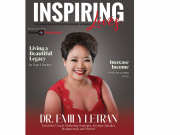As women, if we have learned anything from the pandemic, it is that women are often providing more domestic duties. A recent LinkedIn post referenced Beyonce and said something to the effect of, “Do you think when Beyonce was making Lemonade, she did not have to work hard and examine outside priorities?” A comment on this post stated, “We understand but, with most women their outside priorities are spouse and children. So, what do we do about them? Axe them?” In that same vein, survivor Rachael Denhollander, in the victim impact statement she read at the trial of Dr. Larry Nassar, posed the unforgettable question, “What is a little girl worth?”
I believe it is time we as women take a really hard look at that question, both for ourselves and our daughters. We must learn to negotiate for resources and teach young women to do it also. We must demand that we are financially empowered and that our domestic duties are recognized and valued. We must stop being iron-jawed martyrs. Instead, we must start piecing together ways to demand financial empowerment, security, and respect for our non-economic contributions.
Where do we start? Gain an understanding of your personal finances and do it early. Understand debt to income ratio and what lenders examine to determine your creditworthiness. Separate emotions and economics. Understand and teach other women that being in a romantic relationship does not mean giving away access to financial resources. You do not need your significant other to manage your finances just because you are romantically involved. Make sure you take an active role in your financial situation. Know where money is held, (i.e., which banking institutions and financial institutions). If you are married, make sure you have access to bank accounts and credit cards. Understand what debt is owed on assets and the general estimated value of your assets.
Contemplate and have transparent conversations with your significant other about how both of you will handle finances and the division of child-rearing duties. Teach women that love consists of having direct conversations on these important topics.
Prenuptial agreements are not just for the ultra-wealthy; they can also help couples determine what would be a fair division of domestic duties in their future. If you do enter into a prenuptial agreement, make sure that it: (1) clearly states what separate property you brought into the marriage and (2) contemplates how you will be compensated for the potential financial impact of pregnancy, childbirth, resulting reduction in income-earning capacity, as well as any exiting the workforce to act as a caretaker.
Protect yourself, your spouse, and your children with life insurance policies. Make sure your policy amounts take into consideration the replacement of each spouse’s: (1) income-earning capacity and (2) domestic obligations.
Last but not least, support other women. Listen to Lizzo and Beyonce on repeat. Support female-owned businesses and artists that reflect and align with your female empowerment values. After all, financial empowerment is female empowerment!





































